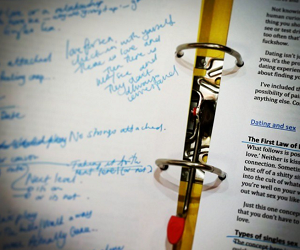‘So why do you want to write a book?’ my publisher asked when we first met for coffee.
‘Because I don’t have a choice about it.’
She waited for more, but there really wasn’t anything to add.
‘Ah,’ she said, ‘well that’s the only good reason to put yourself through this.’
I knew ‘this’. I’d been warned about it by editor and author friends alike. ‘This’ was the long, hard journey of ‘writing a book’, that was like some personal version of Dante’s Inferno.
One editor told me a few months before: ‘Oh yes, it’s going to be an absolutely devastating process. You’re just going to be totally torn from the inside out. Just horrific really.’ She said this all with a darling smile on her face.
That coffee was a year ago. I now have just days until I hand in my manuscript to start its journey to becoming A Book. An actual, hold-in-your-hand paperback. A non-fiction blitz through the stories I’ve lived and lessons I’ve learnt in my time as a sex and relationship columnist. My elevator pitch came to me four months after I’d signed the book deal (cue jazz hands): A ‘how to love and sex in the 21st century without losing your mind’. Ta-daaa…
People keep asking if I’m excited. ‘You must be soooooo excited,’ they beam at me, like they might to a kid going to Sub A. And, honestly, all I can say right now is that ‘excitement’ trails far behind ‘vomity’, ‘tired’, ‘despairing’, and ‘extremely anxious’.
To be fair, it also trails behind ‘having fun’ and ‘feeling proud and brave’. After all these months, I see now what all those people were trying to warn me about: feelings. Because writing a first book is as much a journey through the story, and from one word to the next as you plod through your word count, as it is a slow unpicking of your expectations and fantasies about writing – and all the feelings that come up around that. Feelings that bubble up from the fantasy of being ‘a writer of books’ to the reality of actually being one.
You see, like a million other storytellers, I started creating magic from the moment I found the escape hatch called imagination. And, like most storytellers, I believed that one day I would be ‘a writer’. I had it all planned out. My vision of ‘being a writer of books’ meant having a beautiful writing room and the perfect creative focus.
In my vision, I would sit at my big, writerly desk every day and immerse myself in my story for hours. I would get lost in the weaving of my story and find myself back in the ‘real world’ hours later, tired but triumphant, with reams of perfect words to show.
Yes. Well. The reality has proven quite different. Firstly, there is no special writing room ‘away from it all’. I’m not rich enough for that yet. Instead, I write wherever I can and wherever my mood and my neighbour’s home renovations allow – the table in the dining room, at coffee shops, the tiny table in my bedroom, the table in the spare room.
There is no perfect moment to write. I diarise time for my book every day, but only get to it when all my other billed writing is done. In the wise words of Virginia Woolf: A girl’s gotta eat. I squeeze my book writing in between meetings and hanging out with my loved ones. I have to drag myself away from hours clicking through social media tabs.
Between this chaotic creation I have to pound my way through the feelings that threaten to overwhelm me: ‘this is ridiculous’, ‘no one cares’, ‘no one is going to read this’.
If I had to wait for the all the elements of my youthful fantasy of book writing to align, I’d still be making notes in my teen copy of The Artist’s Way.
For me at least, that is the difference between the fantasy of being ‘a writer of books’ and reality of being one; the difference between imagining the romantic glory of storytelling and the blunt reality of bashing out words, every day, that will one day be a thing.
A thing that people may or may not read, may or may not even like. A thing that will demand your attention, and thrust you among your demons of ‘expectation’, ‘fear of rejection’, ‘the meaning of success’ and ‘self-worth’, and expect you to enjoy the process. And you do. When it hauls you behind it, you don’t let go. Because why would you? What else is there to do?

Leave a Reply